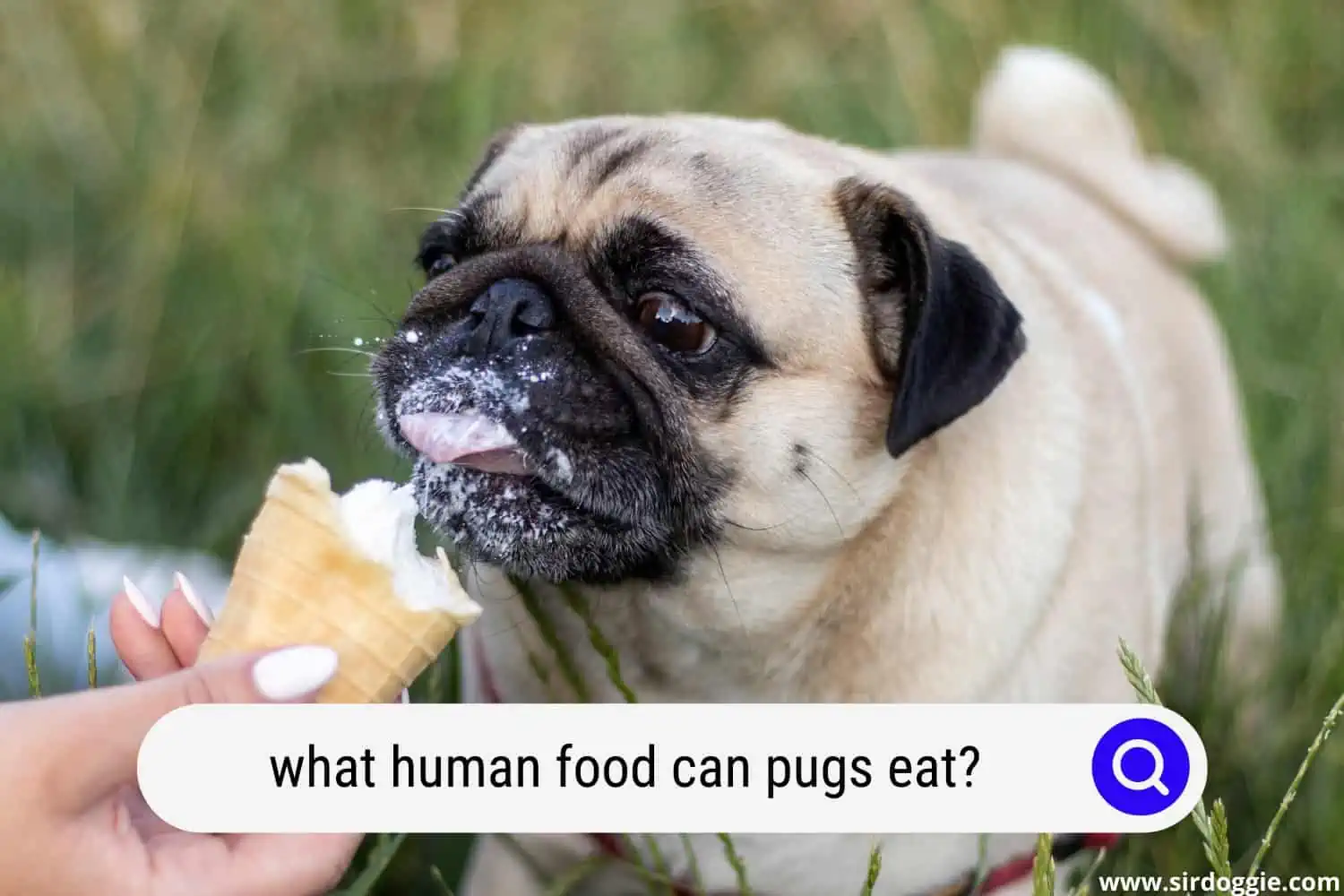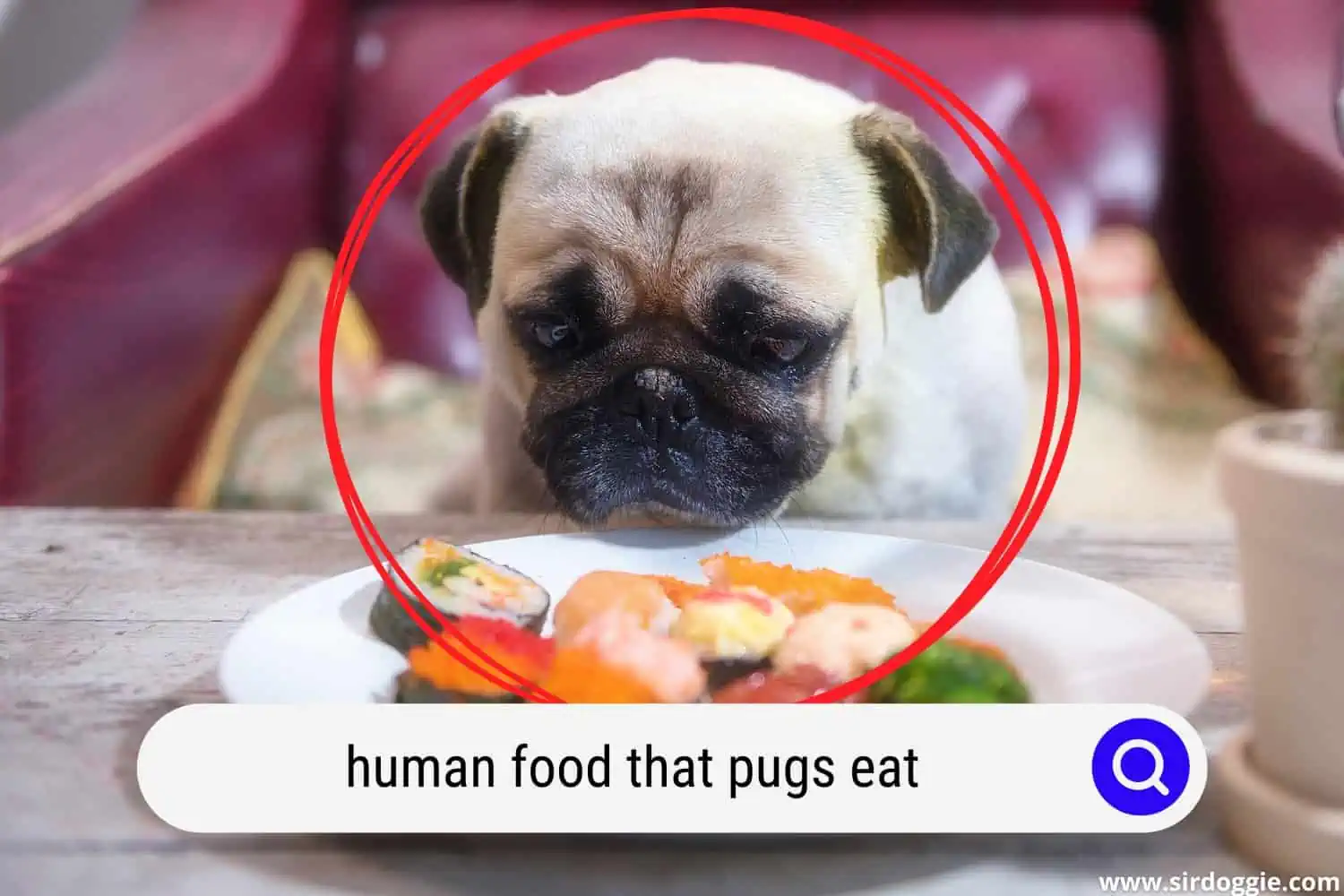What Human Food Can Pugs Eat? A List Of The Safest Products For A Furry Gourmand
We all love to eat good food, savoring every piece and transforming eating into a magical culinary experience. If you prefer homemade meals instead of hitting various restaurants, even better! It is a lot healthier and cheaper to eat at home compared to going out.
Happened to have a Pug pooch in your household? Then you probably want to share your eating-good passion with your canine companion. While it can’t assist you in preparing a delicious dinner, it can help you devour it later.

However, you may be wondering: “What human food can Pugs eat?” And kudos to you for inquiring as not all of them are created equal when it comes to sharing with your beloved wrinkled bud. Time to take a look at some safe-to-eat products that any respectable Pug can enjoy.
What Human Food Can Dogs Eat?
Below you will find a list of the safest human foods your pooch can indulge in guilt-free.
Fruits
The following fructose-packed snacks should be in every mutt’s diet. Not only they are very beneficial for overall canine well-being, but they are also super tasty! You should see my dog begging for a banana or an apple slice once I have it out!
Apples
This crunchy, sweet, and sometimes sour fruit has an abundance of vitamins A, C, fiber, and potassium. By far, one of the most nutritious and healthiest snack options for your furry friend. Dogs can’t resist its yummy taste, which is why it is great to use when training your dog.
Another smart option is to add apple slices into your pooch’s meals for a one-of-a-kind breakfast/dinner. You will see how quickly a mutt will clean up its plate!
Bananas
This potassium-packed sunny fruit will satisfy any picky eater and is amazing in a banana/oatmeal cookie recipe. Make your doggie some homemade banana treats and you will receive plenty of grateful wet kisses! The only thing is that you cannot make this sweet fruit a part of a daily dog diet since it contains a lot of fructose.
Therefore, pooches that are prone to diabetes should eat bananas once in a while, not very often.
Berries
These wonderful canine-friendly snacks are full of vitamins K, C, and B, fiber, potassium, and folic acid. All of those are terrific for any hound’s well-being. However, a dog owner has to watch portions carefully!
It is best to give out a few berries first to see if any adverse reaction is going to take place. Blueberries are generally safe for all canines, while other vitamin powerhouses may need additional testing before a full diet introduction.
Veggies
Most vegetables are generally safe for dogs except for a few like onions, avocado, wild mushrooms, and garlic. Those are highly toxic to our four-legged friends! Therefore, you have to watch carefully so that you don’t drop a piece on the floor while chopping up some of those.
Even a tiny bite can trigger a severe allergic reaction! Let’s take a look at the safe-to-digest veggies for any canine fella.
Cucumbers
One of the safest vegetables to consume for any fluffy pal. Since it contains a lot of water, it is a perfect hot-weather snack. Cucumbers are especially beneficial for “chubby” pooches because they are extremely low in calories.
This means your mutt can eat an almost unlimited amount without gaining extra weight. Also, they contain fiber, which is vital for regulating blood sugar and keeping the feeling of hunger under control.
Carrots
This veggie is great for keeping eye health in check both in humans and the four-legged. Not only that, but carrots also contain biotin, fiber, calcium, and vitamin K for bone strength. Just like their green juicy counterpart, which we’ve just discussed above, they also help keep blood sugar levels in check to help prevent doggie diabetes.
Potatoes
These are not necessarily the healthiest food options for your beloved pooch, but it is rather suitable as a once-in-a-while treat. Potatoes have B-group vitamins, vitamin C, magnesium, iron, and some other essential nutrients needed for your mutt’s development. Best to administer them boiled, steamed, or mashed.
Spinach
Spinach is by far the healthiest leafy green for dogs to consume. Not only does it contain a lot of vitamins like K, A, C, and E, but it is also potassium-, folic acid-, and calcium-rich, keeping your dog’s diet fully balanced.
Meats and fish
Protein-rich turkey, chicken, beef, pork, and an Omega-3 “champion” salmon are all excellent choices even for the pickiest of pooches! Just make sure they are cooked, not raw! And if you are planning to share some with a furry friend, make sure to prepare meats without spices, sodium, and onions!
All of those are going to be very toxic to any canine.
Dairy
I don’t think there’s a dog out there who doesn’t like cheese or plain yogurt! Just ask my pooch, Ariel! She’s a gourmand when it comes to consuming her fave Swiss cheese and organic unsweetened yogurt. Just like meat, dairy products should be given out in moderation.
Now, if we talk specifically about a Pug breed, do its dietary requirements differ from the rest of the canine world? What human food can Pugs eat?
What Human Food Can Pugs Eat?
In case you are one of the lucky Pug owners, you may be asking yourself “What can Pugs eat?”. Any responsible pet parent has to know what products pups can safely consume and not get sick. And speaking of a Pug breed: they can eat pretty much any of the food items we described right above.
The only thing is that a wrinkled owner has to monitor his/her pooch’s portions. This has to be done to avoid an obesity issue Pugs are notorious for developing if they overindulge.
And when it comes to the little ones, what human food can puppies eat?
What Human Food Can Puppies Eat?
Overall, once a pup is weaned off its momma’s milk, it can start consuming canned/dry food with a little chicken and/or rice in it. Both the former and the latter are very beneficial for a sensitive puppy’s tummy. They also help subside hunger so your furry baby feels full and satisfied for hours on end.

Curl-Up
We’ve just covered the safest and most delish products you can share with a man’s best friend. A good rule of thumb is “everything in moderation”. Just as too much of the good stuff can have an opposite effect on a two-legged, the same is true about doggos.
More so with the latter because their digestive system is built differently from ours. If you stick to the food list we’ve covered, you can be sure you are doing something good for your munchkin while keeping it in top health shape.
Related Reading: Food For A 1-Month-Old Pug Puppy: Wet Food Vs Dry Food

Family Dog Expert Author
Hi there! I’m Stuart, a devoted dog lover and family dog expert with over a decade of experience working with our furry companions. My passion for dogs drives me to share my knowledge and expertise, helping families build strong, loving bonds with their four-legged friends. When I’m not writing for SirDoggie, you’ll find me hiking, playing with my beautiful dog, or studying music.